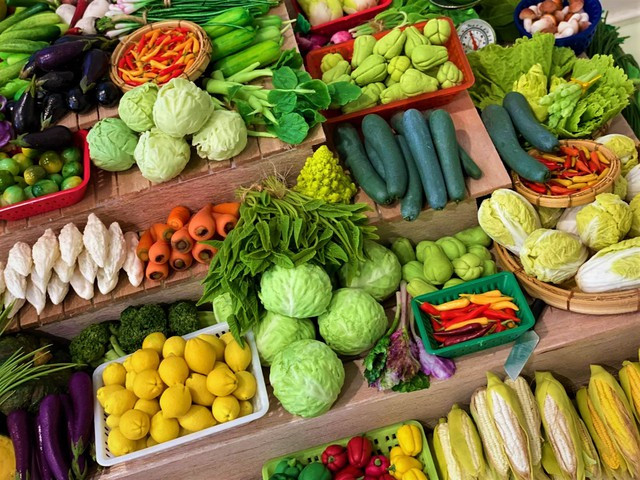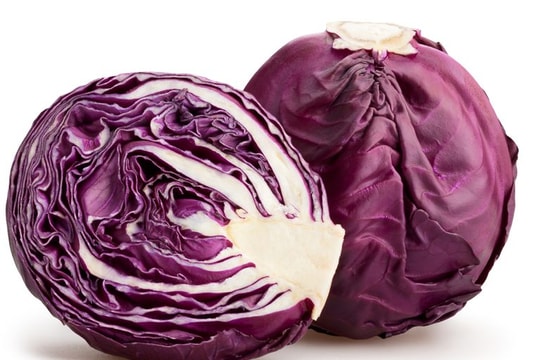4 extraordinary health benefits of vegetables
Eating more vegetables is one of the simplest ways to improve your overall health. Vegetables are packed with vitamins, minerals, and fiber that are beneficial to your health.
Since vegetables are low in calories but rich in nutrients, health experts recommend consuming them daily. A balanced diet, rotating a variety of vegetables is one of the best ways to get nutrients from food from a young age.
1. Health benefits of vegetables

Vegetables are packed with essential vitamins, minerals and antioxidants that provide important health benefits to the body. For example, carrots are rich in vitamin A, which plays an important role in eye health as we age.
Vegetables also bring many other health benefits such as:
Improve digestive health
Vegetables are a great source of fiber, a type of carbohydrate that helps food move through the digestive system. Fiber can also improve the body's absorption of vitamins and minerals, which can potentially boost daily energy levels.
Lower blood pressure
Many leafy greens, such as kale, spinach, and chard, contain potassium. Potassium helps your kidneys filter sodium from your body more effectively, which can lower your blood pressure.
Reduce the risk of heart disease
Green leafy vegetables also contain vitamin K, which is thought to help prevent calcium from building up in your arteries. This can reduce the risk of artery damage and help prevent many future heart health complications.
Controlling diabetes
Vegetables are particularly high in fiber, which is essential for optimal digestion. They have a low glycemic index, so blood sugar levels don't rise as quickly after a meal. The American Diabetes Association recommends eating at least three to five servings of non-starchy vegetables a day, such as broccoli, carrots, or cauliflower.
2. Nutrition of vegetables
Vegetables are rich sources of folate, a B vitamin that helps the body make new red blood cells. Folate is especially important for children's health and may also reduce the risk of cancer and depression.
Vegetables are also a source of essential minerals such as:
Copper, Magnesium, Zinc, Phosphorus, Selenium
Nutrients per serving:
The nutritional content of natural vegetables depends on the type you eat. For example, calories range from 6.5 calories per stalk of celery to 67 calories per 1/2 cup of peas.
Although serving sizes vary depending on the specific vegetable, experts recommend that adults eat one to three cups of vegetables per day.
3. How to incorporate more vegetables into your diet?

Vegetables can be purchased in both organic and conventional varieties. Experts recommend eating plenty of vegetables regularly to maximize their nutritional potential. Not everyone likes eating vegetables, so here are six ways to make eating vegetables easier:
Vegetable salad:Mixed salads with sauces will make the vegetables more attractive.
Vegetable soup: By pureeing vegetables such as cauliflower, carrots, pumpkin... and seasoning appropriately, every family member will enjoy it more.
Vegetable smoothie:Add vegetables and your favorite fruits to make a smoothie that's easier to drink.
Vegetables in bread:Sandwiching vegetables (spinach, lettuce, sprouts, tomatoes...) with a little grilled meat and fried eggs will make it easier to eat.
Stir-fried vegetables:Vegetables will be easier to eat if stir-fried with oyster sauce, garlic or your favorite chicken, beef, pork, shrimp, crab, or fish. Or stir-fry some suitable vegetables (bok choy, cabbage, or spinach, bell peppers, onions, celery, etc.) with noodles, vermicelli, or glass noodles...
Hot pot:Hot pot is a favorite dish with the opportunity to eat many different kinds of vegetables such as celery, cabbage, spinach...
Vegetable omelet:Omelettes are a great way to add vegetables to your diet. Simply fry an egg, then add vegetables including spinach, onions, tomatoes, beans, carrots, bell peppers, etc.
Stew:You can stew meat, pork ribs, beef with vegetables such as pumpkin, bell peppers, potatoes... add cauliflower, broccoli, spinach, or any vegetables you like.
Rolls:Dishes like pig ear spring rolls, shrimp and pork spring rolls, mixed spring rolls, etc. can all be rolled with vegetables.
Grilled dishes:Use a variety of vegetables such as sweet potatoes, onions, corn, okra, bell peppers, cauliflower, onions... with grilled beef or pork.
Many people have difficulty getting the recommended five to nine servings of fruits and vegetables daily. With a little creativity, you can increase your vegetable intake and add variety to your meals at the same time.


